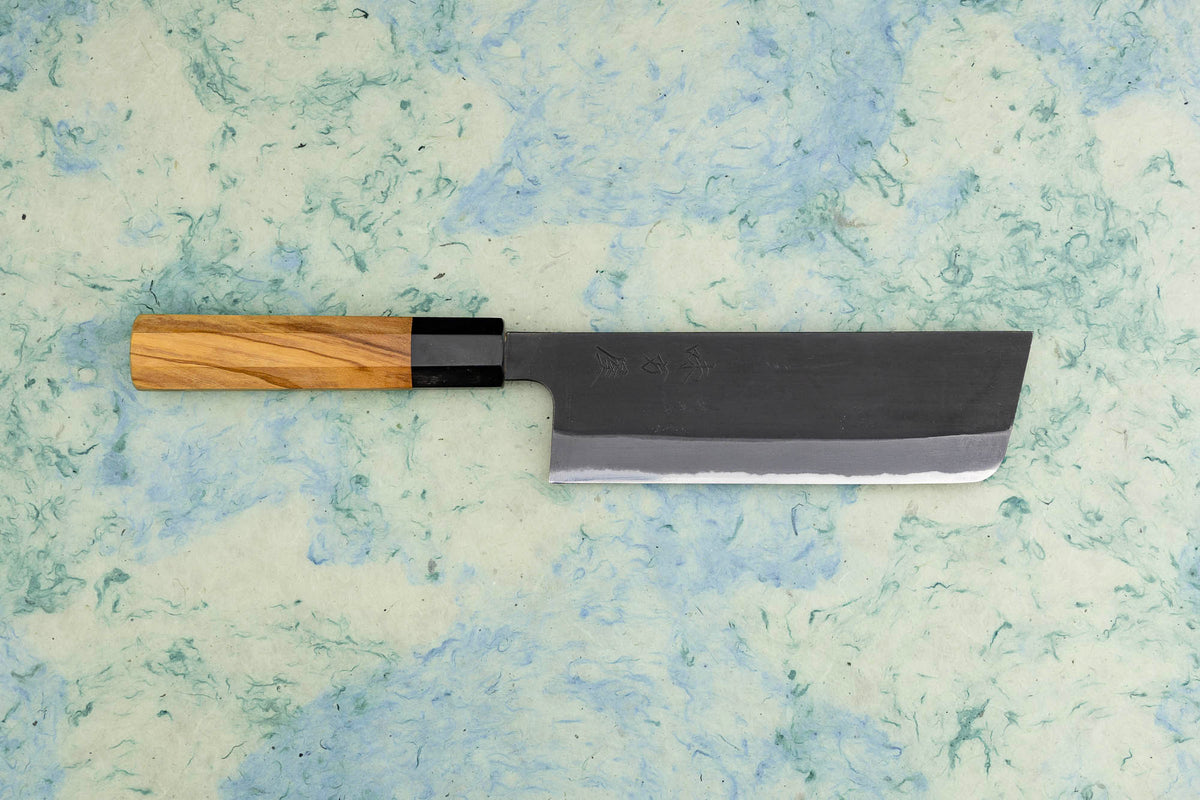Free shipping on orders over $100 - Excluding konro grills
Free shipping on orders over $100 - Excluding konro grills
Japanese Knives
Sharpening
Accessories
Mutsumi Hinoura "Ajikataya" Shirogami Kurouchi Nakiri 165mm
About the Shape: A Nakiri is a vegetable knife. Under utilized in the Western kitchen, the Nakiri’s flat blade is meant for the push/pull chopping of vegetables. Since the entire flat edge of the knife kisses the cutting board at once, you won't be turning the vegetable into an accordion. Accordion vegetables are still connected like a paper doll after you're “done” cutting them. To truly understand the awesomeness of a Nakiri, we recommend making onion soup your first night with the knife. The ease of chopping will blow you away.
About the Blacksmith: Mutsumi Hinoura is the son of renowned blacksmith Tsukasa Hinoura. In his late thirties, he is already considered one of Japan’s most revered blacksmiths. For nearly 2 decades, he studied with his father and is the 4th generation to carry on the family craft. Mutsumi-san lives in Sanjo, in the Niigata region. This area is known for its handmade cutlery.
About the Knife Line: Mutsumi-san's Ajikataya series is deceptively simple at first but reveals his talent upon closer inspection. While the blade is quite hefty with a thick spine and body, it tapers down at the edge beautifully. This construction allows it to cut very smoothly without becoming too delicate. The octagon olive wood handle is an elegant highlight that elevates this knife to something truly special.
| Shape | Nakiri |
|---|---|
| Blade Length | 165 mm |
| Blade Height | 53 mm |
| Blade Thickness Above Heel | 3.4 mm |
| Weight | 210 g |
| Steel Type |
Shirogami #2 (White Carbon Steel)
With Carbon Steel Cladding
Rust Prone ⓘ
This knife can rust, click to learn more.
|
| Rockwell Hardness | 62–63 |
| Blacksmith | Mutsumi Hinoura |
| Edge/Bevel | Double (50/50) |
| Handle | Wa (Japanese) Handle - Octagon Olive Water Buffalo Horn Collar |
| Made in | Tsubame-Sanjo, Niigata, Japan |
A note about measurements: Handmade Japanese knives can vary in their dimensions, so these measurements are only an example.
A NOTE ABOUT RUST
Carbon steel is an awesome material to make knives out of. It’s easy to get sharp and stays sharp a very long time. But this comes with a trade-off; It will rust if you let it. To avoid “bad” rust (orange rust) Wipe the knife dry with a dry cloth after use. Over time, the blade will begin to protect itself with an oxide layer (grey to dark grey “good” rust), this will slow the reaction time but not inhibit the rust entirely. Maintain the good habit of drying off your knife.
USE
• Only cut food you can bite through with this knife. Hard foods can chip the blade. No olive pits, bones, lobster shells, woody stems or parmesan rinds. Cutting frozen food is especially bad because the cold will make hard steel even more brittle. If you wouldn’t chew it with your own teeth, don’t cut it.
• Your cutting surface is the biggest culprit of dulling your knife. Use wood. End grain wood is especially good. Plastic can be fine too, but certainly not glass, granite or bamboo.
• The edge of your knife works best sliding forwards or backwards. Scraping the knife edge sideways will dull or damage the edge. Instead, use the spine of the knife to move foods across the cutting board. Do not twist the edge or pry with the edge, this is the worst screwdriver you ever bought and these motions will certainly damage the edge. Listen to the knife! If you can hear the edge making a “tink” sound on the cutting board, change what you are doing.
CLEANING
• After use, wash the knife by hand with regular dish soap, rinse with hot water and dry by hand immediately. Dishwashers are very bad for knives.
• Wood handles may dry out over time and exposure to water. Simply treat them with some food safe mineral oil or beeswax.
• If you see orange rust, remove it. The scrubby side of a sponge can do the trick. If it’s still not coming off try baking soda and water mixed into a paste or a product called Barkeeper’s Friend.
STORING
• Protect the edge; for your safety and to avoid edge damage. A simple blade cover will do the trick if you keep knives in a drawer or travel case.
• A convenient wall magnet made with wood is a great way to show off your knives. Be sure to put it back spine first, then roll it onto the blade face. This will keep the edge from contacting the wood first.
• The good-ol’ counter top block can keep knives at the ready and protected. So can drawer inserts. Whatever the method, keep the edge from touching anything else.
We aim to ship your order within 1 business day at Knifewear, if there is a hold up, we'll aim to let you know and give you a timeline.
We offer free shipping on orders over $100* anywhere in Canada and $200* to customers in the USA. We ship worldwide, and offer up to the minute rates from our shipping partner DHL.
*Konro Grills and some other larger items are excluded from the free shipping offer.
How do I make a return on an online order?
No worries, we've got you sorted. Head over to https://knifewear.com/returns and follow the prompts.
Can I pick up my order Curbside / At the store?
Absolutely, as long as all the items you are looking for are in stock at the location you want to pickup from, you'll be able to select that at the checkout. If one or more items aren't at your preferred location we are happy to ship it to you.























